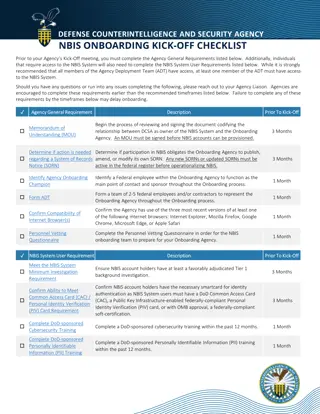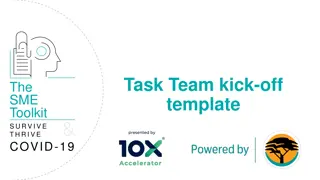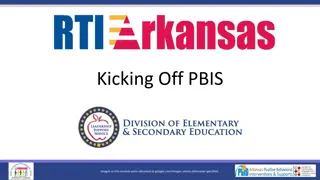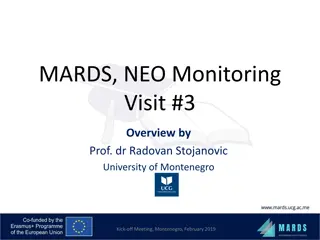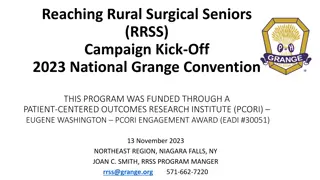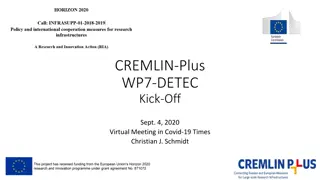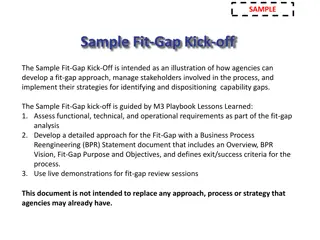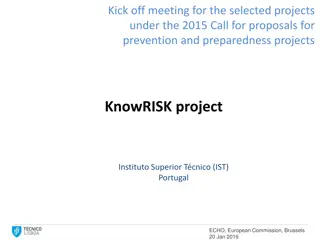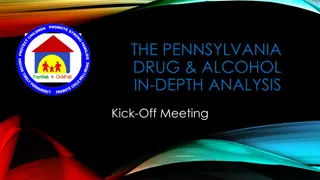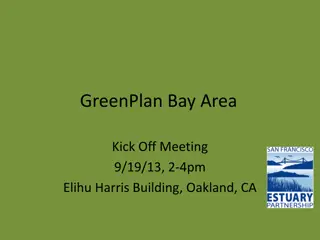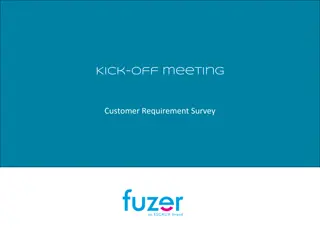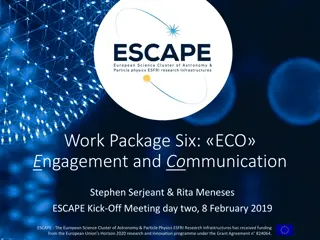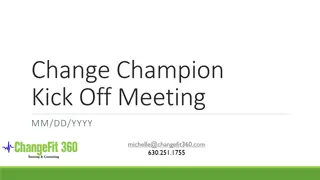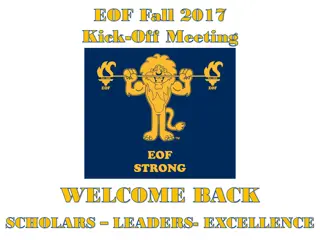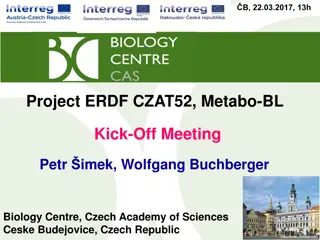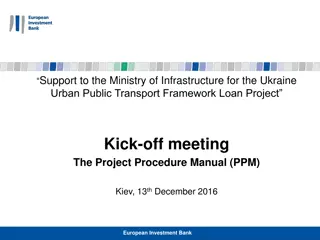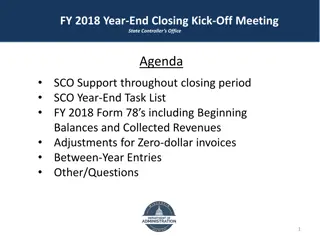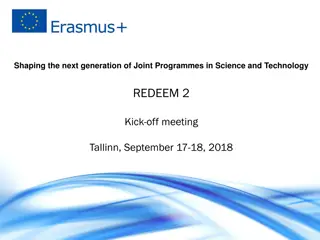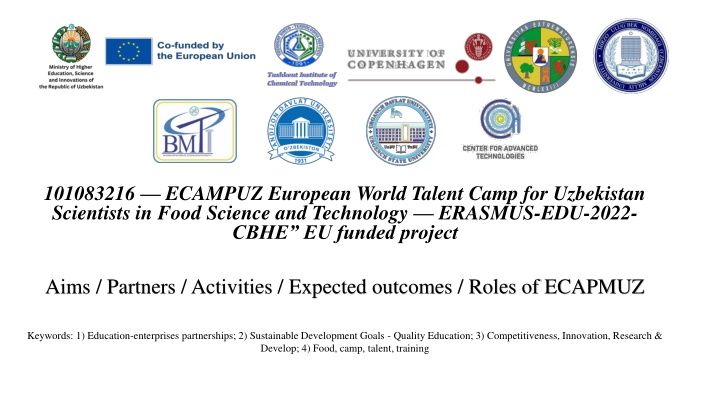
European World Talent Camp for Uzbekistan Scientists in Food Science and Technology - ERASMUS-EDU 2022
Join the European World Talent Camp for Uzbekistan Scientists in Food Science and Technology under the ERASMUS-EDU 2022 project. Explore the project aims, partners, activities, and expected outcomes. Engage in education-enterprises partnerships, achieve Sustainable Development Goals, promote competitiveness, innovation, research, and development in the field of food science.
Download Presentation

Please find below an Image/Link to download the presentation.
The content on the website is provided AS IS for your information and personal use only. It may not be sold, licensed, or shared on other websites without obtaining consent from the author. If you encounter any issues during the download, it is possible that the publisher has removed the file from their server.
You are allowed to download the files provided on this website for personal or commercial use, subject to the condition that they are used lawfully. All files are the property of their respective owners.
The content on the website is provided AS IS for your information and personal use only. It may not be sold, licensed, or shared on other websites without obtaining consent from the author.
E N D
Presentation Transcript
101083216 ECAMPUZ European World Talent Camp for Uzbekistan Scientists in Food Science and Technology ERASMUS-EDU-2022- CBHE EU funded project Aims / Partners / Activities / Expected outcomes / Roles of ECAPMUZ Keywords: 1) Education-enterprises partnerships; 2) Sustainable Development Goals - Quality Education; 3) Competitiveness, Innovation, Research & Develop; 4) Food, camp, talent, training
PROJECT ECAMPUZ Pre-kick off meeting AGENDA TASHKENT, FEBRUARY 16 17, 2023 February 16, 2023, 13:45 18:00 (Tashkent time) 13:45 14:00 Welcome speech by Rector of Tashkent Institute of Chemical Technology prof. Botir Usmonov and representatives of National Erasmus+ office in Uzbekistan. 14:00 14:10 Round table presentation of partners and participants. 14:10 14:40 Presentation of Aims/Activities/expected Outcomes/Partners/Roles of ECAMPUZ & UCPH team by the representative of Partner 2 from the University of Copenhagen. Speaker: Associate Professor Bekzod Khakimov. 14:40 15:00 The representative of Partner 3 from the University of Extremadura Professor Jorge Ruiz-Carrascal presents the group from UEx participating in ECAMPUZ project and describes the roles of UEx as Partner 3. Speaker: Professor Jorge Ruiz-Carrascal. 15:00 15:30 Discussion of the Consortium Agreement between partners, Agenda and venue for upcoming kick-off meeting on 14th April, 2023. Introduction of draft and requirements to Consortium Agreement. Speaker: Professor Zebo Babakhanova. 15:30 15:50 coffee break. 15:50 16:30 - Presentation by Coordinator of project Dr. Zebo Babakhanova from TICT (P1) and Sarvar Kakhkhorov from CAT (P8), project manager Khumora Yunuskhodjaeva on project's Aims/Activities/expected Outcomes/Partners/Roles of ECAMPUZ. 16:30 16:50 Break; 16:50 18:00 Questions, remarks, commentaries by partners regarding the first day of the pre-kick off meeting.
PROJECT ECAMPUZ Pre-kick off meeting AGENDA TASHKENT, FEBRUARY 16 17, 2023 February 17, 2023, 10:00 14:00 (Tashkent time) 10:00 AM 11:00 AM Development of Management plan of project, explanation of working with System for Grant Management, Financial documents, periodic and progress report on FTOP by Zebo Babakhanova (P1), collecting of bank account details of participants. 11:00 AM 11:15 AM Coffee break 11:15AM 12:15 PM - Presentation of budget elucidation by Akmal Boboev (P1), Sarvar Kakhkhorov from CAT (P8). 12:15 PM 12:30 PM Discussion of upcoming deliverables. 12:30 PM 13:30 Lunch. 13:30 14:00 - Questions and remarks by partners regarding the second day of the pre-kick off meeting.
Project number: 101083216 Project name: European World Talent Camp for Uzbekistan Scientists in Food Science and Technology Project Start Date: 15.01.2023 Project End Date: 14.01.2026 Budget: 0.8 mln Euro
Tashkent Institute of Chemical Technology (TICT) University of Copenhagen (UCPH) Zebo Babakhanova, DSc, prof. Akmal Boboev, PhD, Ass.prof. S ren Balling Engelsen, DSc, Prof. Bekzod Khakimov, PhD, Ass.prof. Tomasz Pawel Czaja,Assistant professor Jorge Ruiz Carrascal, PhD, Ass.prof. Pablo Hurtado Pardo, PhD Akbarov Khamdam, DSc, prof. Kholikov Abduvali, DSc, Prof. Berdimurodov Elyor, PhD, Ass.prof. Ulugbek Ibragimov, PhD, Ass.prof. Ismoil Isabaev, DSc, Prof. Uzbekistan (coordinator) Denmark (co-coordinator) University of Extremadura (UEx) Spain National University of Uzbekistan (NUUz) Uzbekistan Bukhara engineering-technological institute (BETI) Uzbekistan Dilshadbek Nurmatov , PhD, Ass.prof. Jamshidbek Khabibullaev , DSc Mansur Radjabov, PhD, Ass.prof. Zabibullo Babaev, DSc, Prof. Andijan State University (ASU) Uzbekistan Urgench State University (UrSU) Uzbekistan Shahlo Turdikulova, DSc, Prof Dilbar Dalimova, PhD Sarvar Kakhkhorov, Ass.researcher Center for Advanced Technologies (CAT) Uzbekistan
Budget Grant Amount Partners Tashkent Chemical-Technological Institute KobenhavnsUniversitet University Extremadura National University of Uzbekistan Bukhara engineering-technological institute Andijan State University Urganch State Uiversity Center for Advanced Technologies TOTAL 136,160 96,690 98,140 50,860 58,850 52,530 59,000 165,125 717,355
Project summary This project aims to build capacity, develop and implement sustainable tools to address the national within the Food sector. The addresses the two most urgent problems in the food sector related: 1) capacity building among food science teachers and researchers; 2) establishment of new and innovative collaborations between HEIs, research institutes and the food industry. The specific tasks include: 1) conduct three consecutive trainings (later referred as camps), one per year, for the talented young professionals 2) training of teaching staff, research staff and PhD students from UZB at the EU HEIs. 3) conduct open-door seminars and workshops to initiate useful networks between researchers and industrial experts 4) establish a Cluster of Advanced Topics in Food Science and Technology for academic networking 5) establish a Uzbek Food Science and Technology Society , which will secure post-project sustainability of the project outcomes
ECAMPUZ is designed to cover three important areas in food science and involves three world leading research groups: 1) Food Analytical Methods and Chemometrics (P2), 2) Food Microbiology and Food Safety (P2 and P3) 3) Food Chemistry and Molecular Gastronomy (P3). This project aims to build capacity, develop and implement sustainable tools to address the national priorities in Uzbekistan (UZB) related to the Sustainable growth and jobs within the Food sector.
Outcomes Train students and researchers in: food quality control, food safety, food fraud detection, food authentication, food production process optimization, optimization of the re-use of natural resources (e.g. water) in the food production, and in the food production waste re-utilization practices in UZB. This will be achieved through educating young food scientists from HEIs and research institutes, in youth CAMPs in EU (WP3) and by training the more senior teachers and researchers in EU HEIs (WP4). In addition, the project addresses omnipresent challenges of the UZB. The major goal of the ECAMPUZ project lays within the Developing the Higher Education sector within society at large and it focuses on knowledge triangle, innovation within the food sector in UZB reinforcing sustainable and mutually beneficial collaborations between food companies and HEIs as well as food research institutes.
Figure 1. E ECAMP CAMPUZ UZ Months Work Package, WP 1 2 3 4 5 6 7 8 9 10 11 12 13 14 15 16 17 18 19 20 21 22 23 24 25 26 27 28 29 30 31 32 33 34 35 36 WP1-PREPARATION Project management and coordination Leader: P1 D1.1 D1.2 WP2-DEVELOPMENT Mapping of skills gaps and mismatches within the UZB target groups identified from the needs analysis. Leader: P8 D 2.1 / 2.2 D 2.2 WP3-DEVELOPMENT European training camp for talented young scientists from Uzbekistan in the field of food science and technology (ECAMPUZ) Leader: P2 D 3.1 D3.2 D3.3 D3.4 WP4-DEVELOPMENT Train- the-trainer scheme in the field of food science and technology Leader: P3 D4.1 D4.2 WP5-DEVELOPMENT Establishment of sustainable collaborations between HEIs and the food industry within UZB and between the EU and UZB Leader: P5 D5.4 D5.2 / 5.3 D5.1 WP6-QUALITY PLAN Project plan security and assurance of the quality of results Leader: P6 D6.4 / 6.7 D6.1 D6.2 D6.6 D6.5 D6.3 WP7-DISSEMINATION & EXPLOITATION Dissemination and exploitation of project and project results Leader: P7 D7.2 D7.1 D7.5 D7.3 D7.4 / 7.6
TARGET GROUPS In WP2 (Review comprising details of target groups' needs based on the initial need analysis) there will be review including the information (details) regarding the needs of target groups (industry) based on the initial analysis for needs. The needs analysis will be managed by P8 through detailed mapping and evaluation of the initial needs analysis results (gap skills and mismatches between HEI and industries). There will be organized face-to-face meetings by P8 with all target groups where they will fill-in questionnaires containing target groups urgent needs and most challenging aspects of the food sector in UZB.
Group 1. Young food scientists that are going to build the future food sector in UZB. This group consists of BSc,MSc and PhD students studying in partner universities in UZB whose education is related to the food science and technology area. T A R G E T Group 2. Food science and technology teachers and researchers that are going to teach the future food science professionals. This target group includes young teachers and researchers as well as deans, heads of departments, study leaders, and laboratory heads from partner universities in UZB. Target group 2 is a key in order to facilitate a multiplication effect of the project s outcomes in UZB in terms of capacity building. G R O U P S Group 3. The food industry employees and stakeholders who are going to apply advances in science to novel foods and processes. This target group include: mainly the food science researchers; experts working in food companies; managers of food industries; heads of research and development divisions in the food companies; other stakeholders including private business owners, authorities, the Ministry of Higher Education, the Ministry of Innovative Development and O zbekoziqovqatxolding.
BENEFITS OF PROJECT The target group 1 of young faculty members of partner universities will benefit from EU training and update their capacities on education and research in advanced food science and technology. The target group 2 of students will benefit from updated teaching materials and better in- class performance, laboratory skills of faculty members, food industry linked case studies and on-site education at newly established partners from food sector of UZB. The third target group is food industry partners that will benefit from strongly improved and better skilled graduates, that will have sufficient knowledge on modern technology and techniques, market requirements, understanding of challenges and industry needs.
ROLES OF PARTNERS WP1 will be led by P1, which is an applicant and a key partner in UZB where majority of UZB food experts are educated, in collaboration with P2. P1 is responsible for the general project management (WP1, Co-lead by P2) and will stay in contact with the EACEA throughout the project. P1 and P2 is also responsible for administration, risk mitigation actions, preparation of the financial reports, and project outcome evaluation reports together with P6 and P4 (the leader of WP6). All project administrative and preparative work (WP1) will be led by the project manager. WP2 will be led by P8 in collaboration with P7 due to their close links with industries and will be responsible for detained skills gap and expertise mismatch in UZB food sectors. P2 has been selected to lead WP3 with co-leaders P1 and P3 mainly because it is the partner providing learning and education programs for CAMP, P1 is educating the majority of UZB food experts, while P2 and P3 will support P1 in selection of students for CAMPs. P3 carries the responsibilities of setting up train-the-trainer scheme based on outcomes of WP2. P5 will cover Bukhara region, P7- Khorezm regions and P1-capital and other regions of UZB.
ROLES OF PARTNERS P5 will lead WP5 in collaboration with P1 and P5 mainly because they are the biggest partner universities in UZB that focuses on implementing research outcomes in industries to solve problems and create jobs in all regions of UZB. P2 will support the project coordinator and lead Local Coordination Team (LCT) for the overall management of project s activities in UZB. Overall quality of results obtained from each WP will be monitored by P6 with a help of P4 in WP6, and will document them twice a year. Financial resources are allocated between partners according to their role in the project, accounting for amount of work required (staff cost), number of students and trainees they will send to CAMPs and EU HEIs for training (see WPs and budget for details). Financial resources of camps will be allocated across all UZB partners and UZB partners will take the responsibilities on how to spend it. EU HEIs will receive trainees from each partner in UZB and will provide the best possible, hands-on training in either teaching or research. P7will lead together with P4 the dissemination and exploitation of project s outcomes, including two planned conferences (WP7).
Activities for the first 12 months of Project Kick-of meeting - planned to be held on 14th April, 2023 in Tashkent. Project website development intended to be managed by March 2023. Review comprising details of target groups is included in D2.1 and planned to be managed by the end of April, 2023 CAMPs organization plan development as well as teaching and training materials preparation the main task of D3.1, which must be completed by May, 2023. Consortium Agreement development and signing must be submitted to System for Grant Management by June, 2023. CAMP 1 with a scheme for an academic food science upgrade will take place in June, 2023 Tashkent, duration 2 weeks. The report of CAMP must be submitted by July, 2023 Quality control plan during the kick-off meeting one person from each partner will be chosen to establish quality team. Verified quality control plan must be submitted to System by June, 2023. Dissemination plan the strategy for dissemination will be presented to QT and discussed during the kick-off meeting. ECAMPUZ website will de developed during the first 2 months and is to be continuously updated by P1. It must be submitted by June, 2023. Train-the-trainer strategy evaluation committee will select most eligible candidates to take part in training. Up to 30 candidates from Uzb will be trained at the EU HEI (up to 3 months). The report of D4.1 must be submitted by November, 2023.

